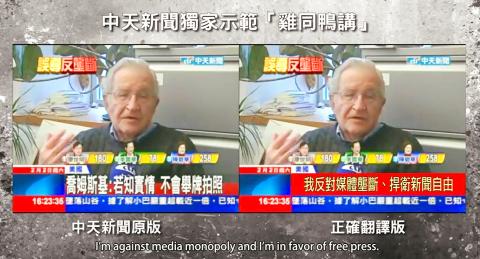CtiTV yesterday apologized for what it described as a “negligent” translation of its interview with Massachusetts Institute of Technology (MIT) professor Noam Chomsky about the ongoing controversy over the movement against media monopolization in Taiwan.
The interview, conducted last week by CtiTV Washington bureau chief John Zang (臧國華), came in the wake of a series of articles in the Chinese-language China Times — part of the Want Want China Times Group (旺旺中時集團) — alleging that Taiwanese graduate student Lin Ting-an (林庭安) had deceived Chomsky by failing to explain the slogan on a placard the professor was photographed holding that denounced “China’s black hands” interfering in local media.
Lin had contacted the 84-year-old Chomsky by e-mail to provide him with background information on the movement and fears of Chinese influence in Taiwanese media before visiting him at MIT. She made the e-mail public last week and said she had explained the situation to Chomsky before the photograph was taken.

Photo: Huang Chen-yi, Taipei Times
As reported by the Taipei Times on Saturday, Chomsky said in an official e-mail response that he did not fully understand the contents of the placard, but denied that he was misled by Lin, blaming the “misunderstanding” on his inability to read Chinese.
In his CtiTV interview with Zang, which was aired on Saturday, Chomsky said he was “misled by my lack of ability to read Chinese,” adding that he could not understand what was on the placard.
“I still don’t know what it says,” he said.
After a narration by Zang, Chomsky then said: “Sometimes it’s a conscious effort to misuse … I found out about such cases so often.”
The comments were not given any context, making it unclear if they were related to the placard, Lin’s approach or any of the sensitive political issues the professor has involved himself with over the decades.
However, Zang tied Chomsky’s remarks firmly to the controversy through a voiceover.
Soon after the interview was aired, people in the movement against media monopolization said that the captions accompanying the segment were also “misleading.”
To prove their point, they then uploaded a video on YouTube with a split screen comparing the translation made by CtiTV on the left-hand side with more accurate captioning on the right.
“Do they think we don’t understand English?” one person said in a Facebook post accompanying a link to the original interview.
In a brief statement on its Web site posted yesterday at about noon, CtiTV apologized for the poor translation of Chomsky’s remarks during the interview and attributed the errors to “negligence.”
It said the segment would be reviewed and improved.
Netizens immediately responded that the apology was inadequate, adding that they strongly doubted the errors were the result of negligent translation, but rather a deliberate attempt to mislead viewers.

Intelligence agents have recorded 510,000 instances of “controversial information” being spread online by the Chinese Communist Party (CCP) so far this year, the National Security Bureau (NSB) said in a report yesterday, as it warned of artificial intelligence (AI) being employed to generate destabilizing misinformation. The bureau submitted a written report to the Legislative Yuan in preparation for National Security Bureau Director-General Tsai Ming-yen’s (蔡明彥) appearance before the Foreign Affairs and National Defense Committee today. The CCP has been using cognitive warfare to divide Taiwanese society by commenting on controversial issues such as Taiwan Semiconductor Manufacturing Co’s (TSMC, 台積電) investments in the

HELPING HAND: The steering committee of the National Stabilization Fund is expected to hold a meeting to discuss how and when to utilize the fund to help buffer the sell-off The TAIEX plunged 2,065.87 points, or 9.7 percent, to close at 19,232.35 yesterday, the highest single-day percentage loss on record, as investors braced for US President Donald Trump’s tariffs after an extended holiday weekend. Amid the pessimistic atmosphere, 945 listed companies led by large-cap stocks — including Taiwan Semiconductor Manufacturing Co (TSMC, 台積電), Hon Hai Precision Industry Co (鴻海精密) and Largan Precision Co (大立光) — fell by the daily maximum of 10 percent at the close, Taiwan Stock Exchange data showed. The number of listed companies ending limit-down set a new record, the exchange said. The TAIEX plunged by daily maxiumu in just

INVESTIGATION: The case is the latest instance of a DPP figure being implicated in an espionage network accused of allegedly leaking information to Chinese intelligence Democratic Progressive Party (DPP) member Ho Jen-chieh (何仁傑) was detained and held incommunicado yesterday on suspicion of spying for China during his tenure as assistant to then-minister of foreign affairs Joseph Wu (吳釗燮). The Taipei District Prosecutors’ Office said Ho was implicated during its investigation into alleged spying activities by former Presidential Office consultant Wu Shang-yu (吳尚雨). Prosecutors said there is reason to believe Ho breached the National Security Act (國家安全法) by leaking classified Ministry of Foreign Affairs information to Chinese intelligence. Following interrogation, prosecutors petitioned the Taipei District Court to detain Ho, citing concerns over potential collusion or tampering of evidence. The

‘COMPREHENSIVE PLAN’: Lin Chia-lung said that the government was ready to talk about a variety of issues, including investment in and purchases from the US The National Stabilization Fund (NSF) yesterday announced that it would step in to staunch stock market losses for the ninth time in the nation’s history. An NSF board meeting, originally scheduled for Monday next week, was moved to yesterday after stocks plummeted in the wake of US President Donald Trump’s announcement of 32 percent tariffs on Taiwan on Wednesday last week. Board members voted to support the stock market with the NT$500 billion (US$15.15 billion) fund, with injections of funds to begin as soon as today. The NSF in 2000 injected NT$120 billion to stabilize stocks, the most ever. The lowest amount it